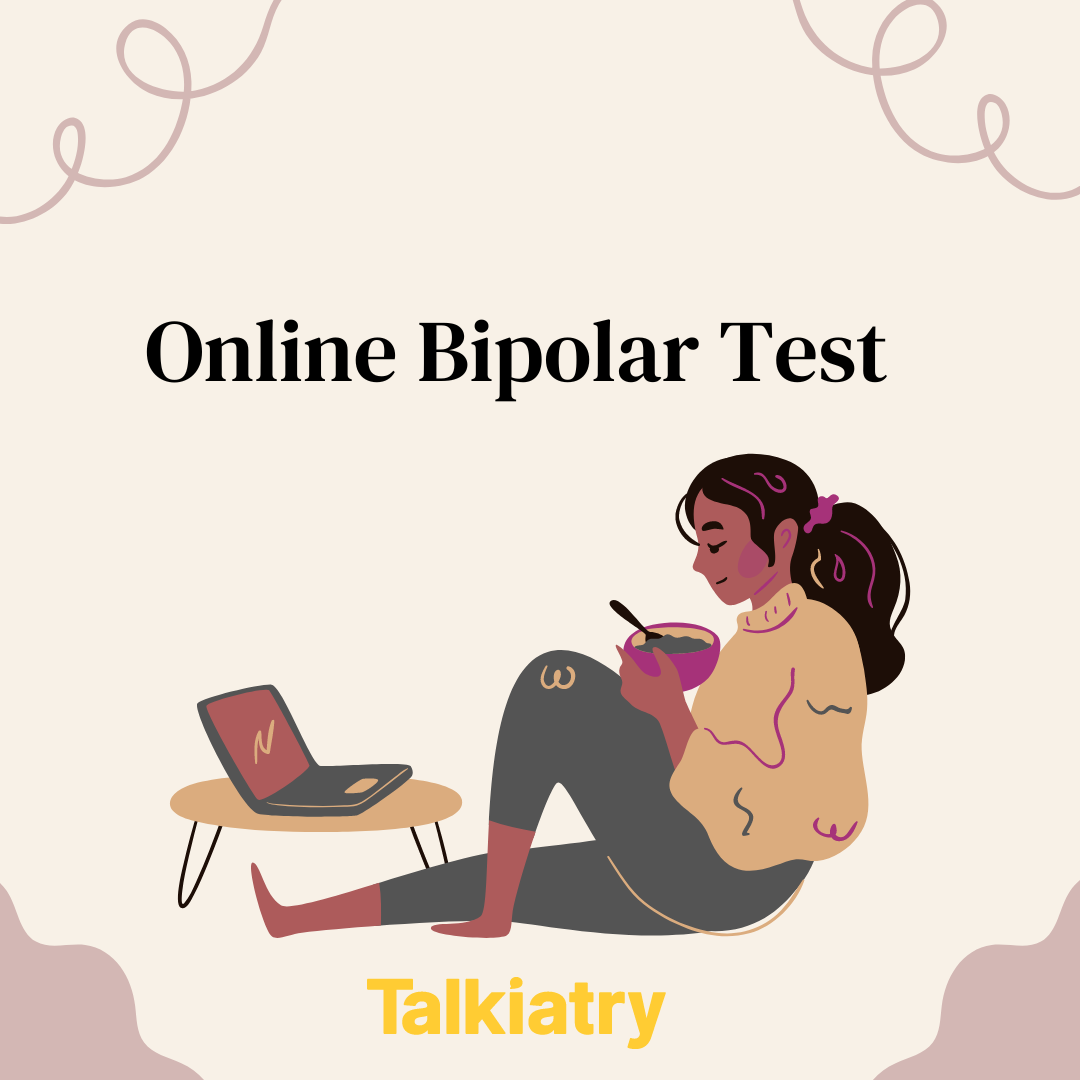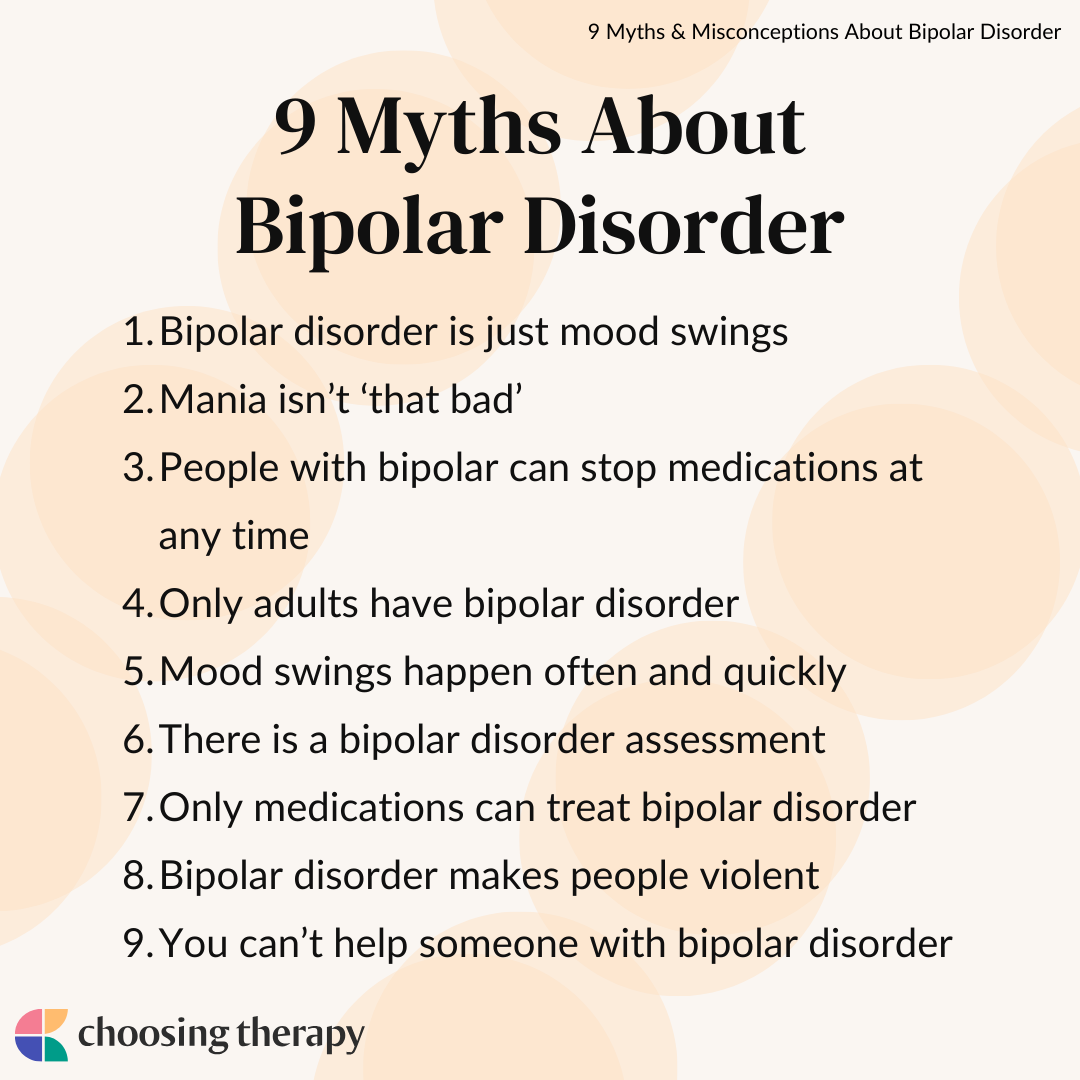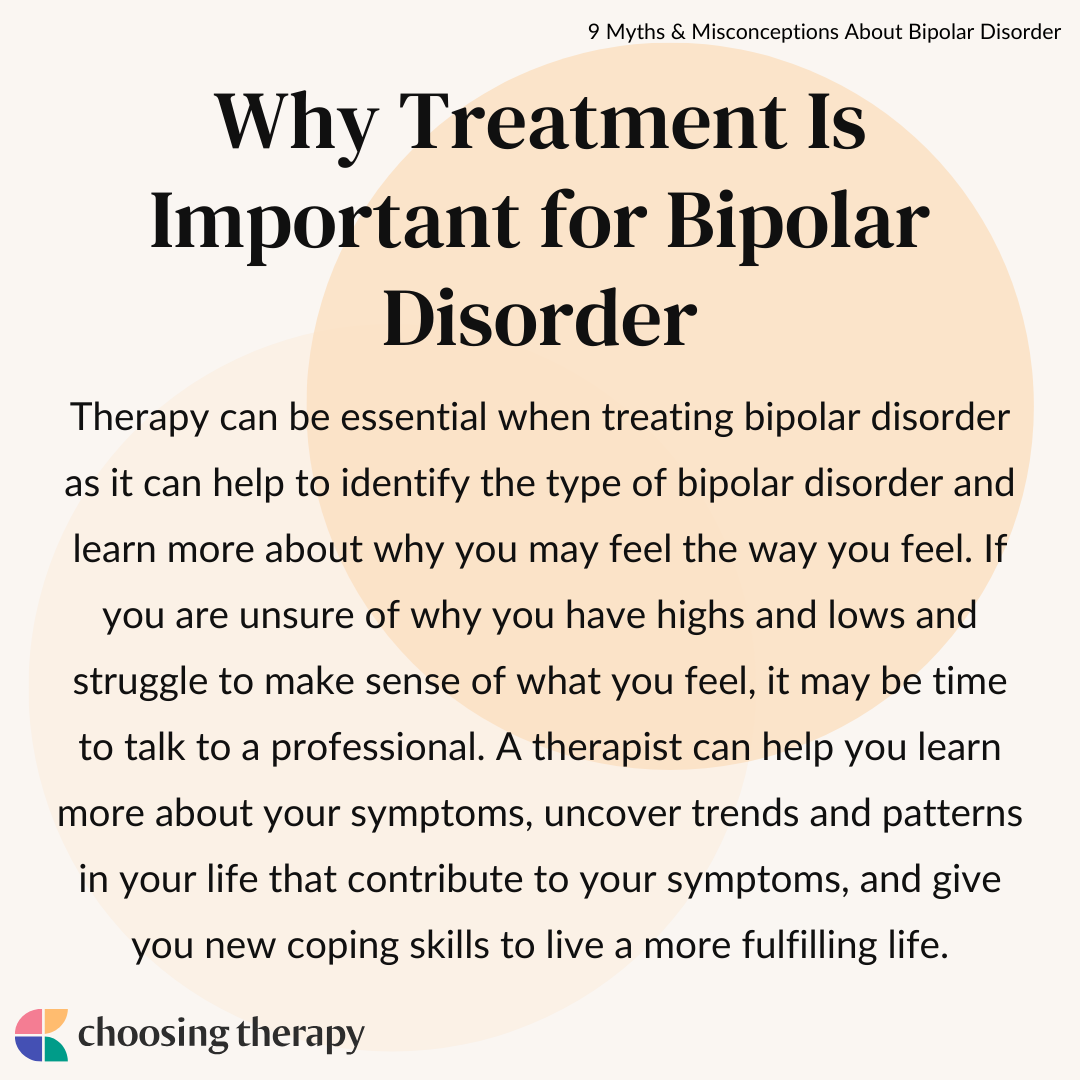Bipolar disorder is a complex mental health diagnosis, and there are still many misconceptions about the condition. Bipolar disorder has a poor reputation, and the way it is depicted in television and movies further stigmatizes the diagnosis. It is important to know the truth and the facts about this condition as it is likely someone you know and love has or will be diagnosed with it in their lifetime.
Psychiatry For Bipolar Disorder Talkiatry offers online, in-network care with psychiatrists who specialize in bipolar disorder. Get started with our 15-minute online assessment.
What Is Bipolar Disorder?
Bipolar disorder is a mental health disorder that causes extreme mood swings, ranging from extreme mania to extreme depression. These mood swings can last for days or weeks and significantly disrupt a person’s ability to function in their day-to-day life.1
The three types of bipolar disorder include:
- Bipolar I: Bipolar I is characterized by a high frequency of manic episodes followed by depressive episodes.
- Bipolar II: Bipolar II involves depressive episodes similar to bipolar I, but instead of mania, people with bipolar II experience hypomania, which is a less severe version of mania.
- Cyclothymic disorder: Cyclothymic disorder is characterized by occasional mild episodes of depressive symptoms and mania, which are not severe to receive a diagnosis of bipolar disorder.
9 Myths About Bipolar Disorder
Bipolar disorder is a common condition with a lot of myths. It is important to learn about the condition and challenge these myths as they perpetuate the stigma of this condition.
Here are nine myths and misconceptions about bipolar disorder:
1. Bipolar Disorder Is Just Mood Swings
Bipolar disorder is so much more than “mood swings.” It is important to know the cycle between depressive symptoms and manic symptoms, as the highs and lows can seem typical for most people, but the way those with bipolar disorder experience these periods is much more intense. Manic episodes include periods of high energy and getting lots of things done. Depressive episodes include periods of lows with minimal motivation and energy to take care of basic activities of daily living.2
2. Mania Isn’t ‘That Bad’
Bipolar disorder mania is more than an energy burst, and episodes can be harmful. Some common symptoms of mania include impulsivity, risk-taking, and emotional dysregulation. Mania can lead people to break the law and engage in socially unacceptable ways. Mania can make it more likely for someone with bipolar disorder to have failed relationships and put them at risk with their work and school. It can also lead to long periods of sleep deprivation, which can be dangerous.2
3. People With Bipolar Can Stop Medications at Any Time
It is never safe for someone with bipolar disorder to stop taking their medication for bipolar disorder without the guidance of a psychiatrist. These medications work on very critical neurotransmitters, and the chemical imbalance created by stopping a medication like that overnight can be extremely dangerous and lead to many withdrawal symptoms. These withdrawal symptoms can be emotional, physical, and mental.2
4. Only Adults Have Bipolar Disorder
Bipolar can affect individuals of all ages. It is important to be aware that bipolar disorder in children and teens differs from symptoms in adults. In children, some warning signs of mental illness that parents or caregivers can look for in their children include aggressiveness towards others and themselves, separation anxiety, and sleep issues.3
5. Mood Swings Happen Often & Quickly
Bipolar mood swings do happen however, the episodes of mania or depression usually last at least a week, if not longer, before switching to the other mood. Day-to-day changes in mood are typical for us all as part of the human experience. Long periods of depression followed by long periods of mania are the types of mood swings that are characteristic of bipolar disorder.4
6. There Is a Bipolar Disorder Assessment
Unfortunately, there is no one questionnaire or test to diagnose or determine bipolar disorder. Diagnosing bipolar disorder can take time and several assessments. Taking a family history of mental health issues and understanding a person’s individual trauma history is also important to consider. All of these combined are part of the assessment, as well as consulting with a therapist and psychiatrist.4
7. Only Medications Can Treat Bipolar Disorder
Medication can help to treat bipolar disorder; however, people will still need to learn how to live with their bipolar disorder symptoms as the medications are not a cure-all. A comprehensive treatment plan for bipolar disorder may include medication, therapy, and lifestyle changes.4
Help For Bipolar Disorder Online Psychiarty For Bipolar Disorder – Talkiatry can match you with a real psychiatrist who takes your insurance and is seeing new patients. They’re in-network with major insurers and offer medication management. Most psychiatry visits cost patients $30 or less* Free Assessment Talk Therapy – Get help from a licensed therapist that has expertise with bipolar. BetterHelp offers online therapy starting at $65 per week. Visit BetterHelp *Includes copayment, deductible, coinsurance, and $0 Visits. Excludes no shows.
8. Bipolar Disorder Makes People Violent
Bipolar disorder doesn’t make people violent at baseline. It can make it harder for people to respond to challenges in a healthy way. However, bipolar disorder aggression can range from an individual with bipolar disorder blaming others, yelling when frustrated, or acting violently, and violence is quite rare.5
9. You Can’t Help Someone With Bipolar Disorder
Bipolar disorder is a mental health condition that warrants the same empathy and compassion as any other condition. It is important to remain validating and reassuring to your loved one with bipolar disorder. Learning the facts about bipolar disorder (as opposed to the myths) and knowing how it can make the individual feel is key. Showing interest and care in their experience helps them feel less alone and will help them less likely to act aggressively.6
Why Treatment Is Important for Bipolar Disorder
Therapy can be essential when treating bipolar disorder as it can help to identify the type of bipolar disorder and learn more about why you may feel the way you feel. If you are unsure of why you have highs and lows and struggle to make sense of what you feel, it may be time to talk to a professional. A therapist can help you learn more about your symptoms, uncover trends and patterns in your life that contribute to your symptoms, and give you new coping skills to live a more fulfilling life.
You can use a therapist directory to find a therapist who specializes in bipolar disorder. You can also contact your insurance and ask for a list of providers who take your insurance. Alternatively, an online therapy service who takes insurance may be the right option if you prefer therapy from the comfort of your own home.
In My Experience
Choosing Therapy strives to provide our readers with mental health content that is accurate and actionable. We have high standards for what can be cited within our articles. Acceptable sources include government agencies, universities and colleges, scholarly journals, industry and professional associations, and other high-integrity sources of mental health journalism. Learn more by reviewing our full editorial policy.
-
Baldessarini, R. J., Vázquez, G. H., & Tondo, L. (2020). Bipolar depression: a major unsolved challenge. International journal of bipolar disorders, 8(1), 1. https://doi.org/10.1186/s40345-019-0160-1
-
Marquard, K., & Mapaling, C. (2023). Myths and Misconceptions About Bipolar Disorder. Mental Health Matters, 10(2), 6-7.
-
Abdullayeva, N., Poulsen, R., Mavrides, N. A., & Coffey, B. J. (2020). Myth or Reality: Classic Manic Symptoms in Adolescent Male Diagnosed with Bipolar Disorder. Journal of child and adolescent psychopharmacology, 30(4), 273-275.
-
Hupp, S., & L., S. M. C. (2023). Pseudoscience in therapy: A skeptical field guide. Cambridge University Press.
-
Pollock, M. (2022). Debunking the myth of the ‘mentally ill’mass shooter. Mental Health Weekly, 32(35), 5-5.
-
Connors, M. H. (2023). Misconceptions about paediatric bipolar disorder. Acta Neuropsychiatrica, 35(6), 374-376.

Your Voice Matters
Can't find what you're looking for?
Request an article! Tell ChoosingTherapy.com’s editorial team what questions you have about mental health, emotional wellness, relationships, and parenting. The therapists who write for us love answering your questions!
Leave your feedback for our editors.
Share your feedback on this article with our editors. If there’s something we missed or something we could improve on, we’d love to hear it.
Our writers and editors love compliments, too. :)
Education is just the first step on our path to improved mental health and emotional wellness. To help our readers take the next step in their journey, Choosing Therapy has partnered with leaders in mental health and wellness. Choosing Therapy may be compensated for marketing by the companies mentioned below. Online Psychiatry For Bipolar Disorder Talkiatry – Our Psychiatrsts Can Diagnose Your Condition, Prescribe Medication, And Monitor Your Progress. Most psychiatry visits cost patients $30 or less* Free Assessment Talk Therapy Online-Therapy.com – Get support and guidance from a licensed therapist. Online-Therapy.com provides 45 minute weekly video sessions and unlimited text messaging with your therapist for only $64/week. Get started Starting Therapy Newsletter A free newsletter for those interested in learning about therapy and how to get the most benefits out of therapy. Get helpful tips and the latest information. Sign Up DBT Skills Course Jones Mindful Living Dialectical Behavior Therapy (DBT) is a popular treatment for BPD. Learn DBT skills with live weekly classes and online video courses for only $19 per month. Free One Week Trial Choosing Therapy Directory You can search for therapists by specialty, experience, insurance, or price, and location. Find a therapist today. *Includes all types of patient cost: copayment, deductible, and coinsurance. Excludes no shows and includes $0 VisitsAdditional Resources
Online Bipolar Test A few questions from Talkiatry can help you understand your symptoms and give you a recommendation for what to do next. Best Online Psychiatry Services Online psychiatry, sometimes called telepsychiatry, platforms offer medication management by phone, video, or secure messaging for a variety of mental health conditions. In some cases, online psychiatry may be more affordable than seeing an in-person provider. Mental health treatment has expanded to include many online psychiatry and therapy services. With so many choices, it can feel overwhelming to find the one that is right for you.








